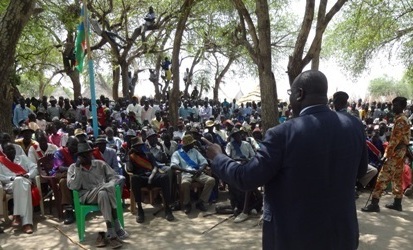Lou-Nuer chiefs criticise Juba for not protecting civilians
February 18, 2013 (JUBA) – Chiefs from the Lou-Nuer community of Walgak payam in Akobo county have criticised the government for not doing enough to protect their vulnerable disarmed populations in South Sudan’s Jonglei state.

Fourteen soldiers belonging to the South Sudanese army (SPLA) also died in the attack while trying to repel the attackers.
Many more civilians were also wounded in the surprise attack and thousands were displaced, with many forced into neighbouring Upper Nile state, prompting fears of humanitarian disaster in the area.
On Sunday, South Sudan’s Vice-President Riek Machar led a high-level security and humanitarian delegation to the scene of the attack where they paid their condolences to the bereaved families and reassured the affected populations of the government’s commitment to disarm all the civil populations in the state.
The community has been disarmed many times and successfully, they said, but left vulnerable to the repeated attacks by the heavily armed roaming neighbouring youth of the Murle community.
The first attempt to disarm another section of the Lou-Nuer in Uror County in 2006 was bloody and resulted in to the loss of more than 500 people on both sides.
During the visit of the Vice-President to Walgak, chiefs and elders in the area expressed anger over what they said was government’s negligence, which left them vulnerable to the “defying” armed Murle community and Yauyau’s rebel militia.
“We listened to the government and accepted disarmament but we unfortunately fall victim to the defying Murle community which has refused to disarm,” an elder told the Vice-President.
In December last year Machar traveled to Lukangol after an attack on the area by Luo-Nuer youth to try to persuade them not to continue their incursion into Pibor county, which they said was to disarm the Murle and return women and children abducted in previous raids.
Despite giving assurances to Machar, the 6,000 strong group entered deeper into Pibor attacking the county headquarters and many other areas. They are thought to have acquired arms from rebels linked to the late George Athor.
The incursion into Pibor and reprisal attacks by the Murle displaced 140,000 people, according to the United Nations, triggering a humanitarian crisis. The Luo Nuer’s 12-day revenge attack, which spanned from December 2011 to January 2012, was the largest and most prominent of a series of clashes between the Murle and other ethnic groups that killed over 2,000 people in 2011 and 2012.
President Salva Kiir responded by deploying 15,000 extra soldiers and police to the region in March last year to disarm all communities in the state. The forces collected over 10,000 weapons but some groups avoiding handing over their weapons such hid their weapons or registered major successes in disarming other communities, but continue to face resistance in Murle areas.
In June last year UN released a report calling on the government to investigate cases of alleged human rights violations carried out by members of South Sudan’s armed forced during the operation.
Abductions of women and children, the destruction of homes and the displacement of thousands of civilians are common dynamics of the conflict a report, compiled by the UN Mission in South Sudan (UNMISS) with support from the Office of the High Commissioner for Human Rights (OHCHR) found in June 2012.
In May 2012 the six main Jonglei tribes signed a peace deal to end the cycle of ethnic violence in the area. However, some groups have avoided the process and Yauyau’s rebellion continues in Pibor County.
(ST)
ST – Visit of VP after 100 killed “of no use”, say Akobo residents
